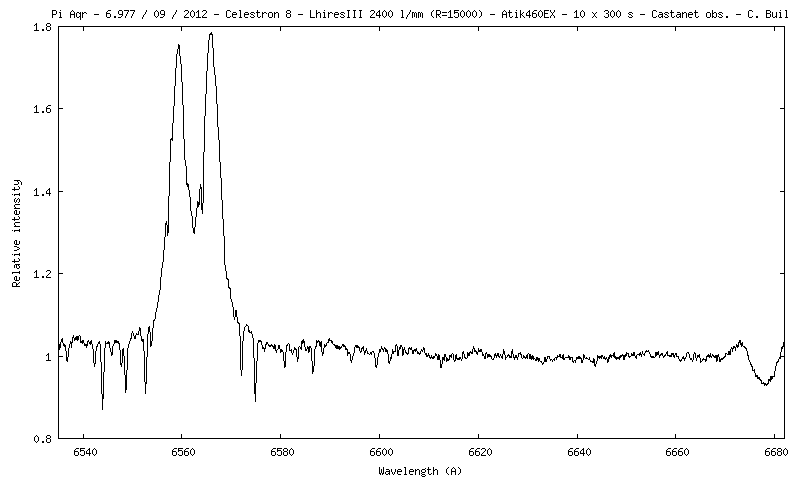"Halpha-V/R period analysis of the binary pi Aqr".
Accepted for publication in IBVS No. 6023
Preprints as pdf:
http://astrospectroscopy.de/IBVS%206023.pdf
Ernst Pollmann
----------------------------------------
Active Spectroscopy in Astronomy
http://www.astrospectroscopy.de
http://www.astronomie.de/astronomische- ... troskopie/
pi Aqr
-
Ernst Pollmann
- Posts: 461
- Joined: Mon Sep 26, 2011 7:16 pm
Re: pi Aqr
Because the last V/R minimum more or less accurate could be observed, here a preliminary period analysis, on base of all V/R data until now (see attachment).
The period 83.79 d confirms the suggested period of 83.8 d in my IBVS paper No. 6023 (May 2012). Despite this nice result, we should observe further the star for the rest of its visibility phase. Until now a great success of collaboration.
Ernst Pollmann
Active Spectroscopy in Astronomy
http://www.astrospectroscopy.de
http://www.astronomie.de/astronomische- ... ktroskopie
The period 83.79 d confirms the suggested period of 83.8 d in my IBVS paper No. 6023 (May 2012). Despite this nice result, we should observe further the star for the rest of its visibility phase. Until now a great success of collaboration.
Ernst Pollmann
Active Spectroscopy in Astronomy
http://www.astrospectroscopy.de
http://www.astronomie.de/astronomische- ... ktroskopie
- Attachments
-
- fig. 1.JPG (55.18 KiB) Viewed 5902 times
-
- fig. 2.JPG (46.35 KiB) Viewed 5902 times
-
Christian Buil
- Posts: 1432
- Joined: Mon Sep 26, 2011 6:59 pm
- Contact:
Re: pi Aqr
Excellent Ernst!
A new observations last night taken from Castanet obs., C8 tel., Lhires III + Atik460EX CCD camera)
(submited to BeSS)

(note the tentative for a simultaneous observation of Halpha and He lines).
Christian B
A new observations last night taken from Castanet obs., C8 tel., Lhires III + Atik460EX CCD camera)
(submited to BeSS)

(note the tentative for a simultaneous observation of Halpha and He lines).
Christian B
-
Ernst Pollmann
- Posts: 461
- Joined: Mon Sep 26, 2011 7:16 pm
Re: pi Aqr
Information for pi Aqr observers:
attached you can find the current Halpha V/R state.
Its maximum has been reached (I guess), and the descent will start during the next few days.
We can be proud, this is the first time, that a full V/R cycle has been observed. If we continue our observations, we have the chance to detect also the next minimum.
So, at the end of the visibility a more precise period analysis will be possible.
Ernst Pollmann
Active Spectroscopy in Astronomy
http://www.astrospectroscopy.de
http://www.astronomie.de/astronomische- ... ktroskopie
attached you can find the current Halpha V/R state.
Its maximum has been reached (I guess), and the descent will start during the next few days.
We can be proud, this is the first time, that a full V/R cycle has been observed. If we continue our observations, we have the chance to detect also the next minimum.
So, at the end of the visibility a more precise period analysis will be possible.
Ernst Pollmann
Active Spectroscopy in Astronomy
http://www.astrospectroscopy.de
http://www.astronomie.de/astronomische- ... ktroskopie
- Attachments
-
- VR_piaqr.jpg (68.58 KiB) Viewed 5836 times
-
Ernst Pollmann
- Posts: 461
- Joined: Mon Sep 26, 2011 7:16 pm
Re: pi Aqr
A provisional period analysis of the Halpha V/R behavior is to find at:
http://astrospectroscopy.de/VR_piaqr.pdf
I think that the diagrams are self-descibing.
Particularly the campaign analysis, beginning at JD 2456104, has been possible only with spectra of following colleagues:
Urban, Kalbermatten, Debreuil, Favaro, Garrel, Buil, Mauclaire, Martineau, Bouchet, Dias, Terry, Graham, Desnoux.
Thanks to all !!
Ernst Pollmann
Active Spectroscopy in Astronomy
http://www.astrospectroscopy.de
http://www.astronomie.de/astronomische- ... ktroskopie
http://astrospectroscopy.de/VR_piaqr.pdf
I think that the diagrams are self-descibing.
Particularly the campaign analysis, beginning at JD 2456104, has been possible only with spectra of following colleagues:
Urban, Kalbermatten, Debreuil, Favaro, Garrel, Buil, Mauclaire, Martineau, Bouchet, Dias, Terry, Graham, Desnoux.
Thanks to all !!
Ernst Pollmann
Active Spectroscopy in Astronomy
http://www.astrospectroscopy.de
http://www.astronomie.de/astronomische- ... ktroskopie